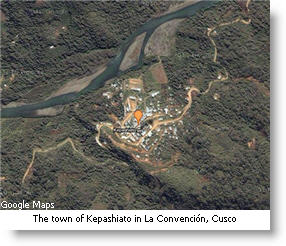 Peruvian authorities say they will conduct a full investigation into the shooting up of a minibus full of passengers by military personnel in the remote mountainous jungle region of La Convención in southern Peru.
Peruvian authorities say they will conduct a full investigation into the shooting up of a minibus full of passengers by military personnel in the remote mountainous jungle region of La Convención in southern Peru.
The Joint Command of the Armed Forces issued a statement Monday saying that nine people were injured when soldiers opened fire on a minibus outside the town of Kepashiato. The bus was en route to Quillabamba. State news agency Andina said that the victims were taken to a nearby hospital and the individuals are in stable condition, although five have serious injuries. The state agency reported that one of the injured is a toddler.
The army said that soldiers came across the vehicle “suspiciously” stationed on the roadside and saw a man with an assault rifle get into the bus. Security forces believed that the minibus was carrying narco-terrorists linked to Shining Path rebels, who are heavily involved in cocaine trafficking.
According to the military, the vehicle didn’t yield to warnings from soldiers and as a result the security personnel opened fire. Another statement said that someone in the minibus began to fire towards the patrol.
While the armed forces said initially that the minivan was carrying at least one narco-terrorist, officials on Tuesday came out to clarify that none of the people are members of the Shining Path or affiliated with the rebels.
“It has been fully established that none of the people who were traveling in the vehicle, among them a one-year-old child, had anything to do with terrorism,” Attorney General Jose Pelaez said.
Pelaez said that an investigation will occur to determine what exactly happened, daily El Comercio reported.
Residents in Kepashiato said they planned to organize demonstrations to protest the shooting and seek compensation for the victims of the incident, RPP radio reported.
The head of the Joint Command of the Armed Forces, Admiral Jose Cueto, said the military was providing medical services for the injured, but wouldn’t guarantee that the victims will receive compensation.
“I can’t give this guarantee until it is determined in the investigations,” he said. “We are trying to avoid some kind of confrontation, that isn’t what we are looking for.”
Cueto said that the military were not intending to kill the people in the minibus when they opened fire. “If the patrol really wanted to kill, I’m completely sure that everyone would be dead,” he said.
The incident points to the risk that the population in the area face as Peru’s government seeks to root out the Shining Path rebels in the VRAEM area. It could also strengthen the argument of government critics who are concerned residents could become the victims in the government’s campaign to militarize the area.
Life in the small town of Kepashiato has been disrupted violently since Shining Path rebels kidnapped some 40 workers from the nearby natural gas pipeline works in April 2012, and military and police troops came into the town to set up barracks in the local school, a decision made by the military despite pleas from local authorities to use other buildings and that led to the wounding of one soldier and a young schoolgirl by a Shining Path sniper only a month later.
Some human rights advocates have said they are worried that the local population could be caught in the middle of fighting between security forces and rebels, resulting in abuses like those perpetrated at the height of Peru’s internal conflict in the 1980s and 1990s.
Indeed, the shooting of the minivan isn’t the first case of innocent people being caught in the middle of the fight since President Ollanta Humala took office in 2011.
In September last year, Peru’s government said that it rescued three children who were being held captive by the Shining Path in the zone. First Lady Nadine Heredia and Minister of Women Ana Jara were photographed holding the very young children after they were flown to Lima. Admiral Cueto and other government officials held up the rescue as evidence that the Shining Path has been using children to fight.
Only days later did local media reveal that the children had been taken from their parents, who were rural farmers and not members of the Shining Path. That scandal deepened when it was revealed that the sister of the children, 9-year-old Zoraida Caso, was killed by military bullets, apparently when they were pursuing rebels.
The mayor of La Convención province, Fedia Castro, who governs over the areas of Kepashiato and Kiteni, is requesting a meeting with President Humala. She says that the military are geographically “ignorant” of the area they are patroling, and argues that the area is not within the valleys of the Vraem zone supervised by the military.
Political analyst and former Minister of the Interior, Fernando Rospigliosi, said that incidents like these lead to mistrust towards the military by local populations. “After so many years of internal warfare there should be an appropriate protocol to prevent these types of incidents.”





